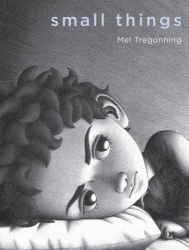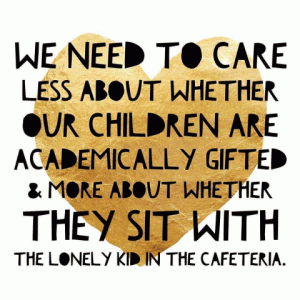small things
Mel Tregonning
Allen & Unwin, 2016
40pp., hbk., RRP $A29.99
9781742379791
Over recent weeks my life seems to have been leading up to opening this book.
It started with a friend’s son committing suicide and my going back into the classroom as a volunteer to allow a colleague to attend the funeral.
There was RUOK Day which is a big thing for me because suicide has touched my life too many times.
Three schools I’ve been associated with have recently installed buddy benches.
This story came through my Facebook feed-Teen Makes Sit With US App That Helps Students Find Lunch Buddies and then, this morning, this meme…
Even so, I was not prepared for the storyline of this important book even though I’d skimmed posts about its launch on my network connections. Let the blurb tell it for you…
An ordinary boy in an ordinary world. small things tells the story of a boy who feels alone with his worries, but who learns that help is always close by.”
Perhaps a storyline that has been done one way or another many times – but then, on the publishers’ blurb there is this…
In 2008, Mel began illustrating a graphic novel about the universal feelings of loneliness and happiness. In May 2014, Mel took her own life.
It is the most absorbing story of a boy who is dealing with lots of the small things in life that we all face but which affect each of us differently – small things that appear to be so unimportant that they don’t even require capital letters in the title. Yet, while for some they may be no big deal, for others they lead to sadness, anxiety and depression exacerbated by the perception that you are the only one feeling this way. Other people can make friends, other people can do pesky maths problems, other people can play basketball – why can’t you? And the thoughts and doubts start grow and become demons which start to chip away from the inside out and then open cracks until you are surrounded by and followed by them. They constantly exude from you without let=up until you are so overwhelmed that the pain of keeping them in is greater than physical pain of letting them out. So you give them a helping hand and for a brief minute one pain exceeds the other. But when even that doesn’t help and the darkness descends…
Mel died before she completed her book and the wondrous Shaun Tan completed the final three pages. And in doing so, he turns the darkness around into a powerful and hopeful ending so that even though there are small things that can cause such despair and desolation there are other small things that can lead to hope and happiness. It’s a story about discovering your place in the world and finding your path through it; about realising that while others’ paths may seem the same as yours, theirs may have obstacles invisible to you and hurdles they find too hard to climb; about being aware of others as well as ourselves and developing and showing empathy; about discovering that others have similar pains and you are not alone; about building a sense of a strong self and knowing and employing the strategies to achieve this. For all its physical, emotional and conceptual darkness, it is a story about light.
With so many of our students, even very young ones, struggling with bullying and mental health issues that too often lead to the dire consequences of drugs and death, this is an important book for teachers to examine so we can be alert to the needs of the children in our care and consider whether the remark made in jest or the less-than-average grade might have a deeper impact than we think. It’s about the need to help our children build a core of resilience and self-esteem so they can cope when their expectations are not realised and to help parents understand that stepping in and solving every problem for a child in the short term in not necessarily the best solution in the long term. It’s about helping our children understand that there are not losers, only learners.
It’s about so much more than one reviewer can express in one review. Perhaps its most critical role is that it even though it encapsulates the feelings and thoughts of the boy in its evocative pictures so well that no words are needed, it becomes the conversation starter – more than that, it generates a loud call to action.
On a literary level I believe this will feature in the CBCA Book of the Year lists in 2017; on a social level it is so much more important than that.
There are Teachers Notes for both primary and secondary available and they come with a warning of how you use it because of the nerves that may be touched, a warning I would echo. Do not share this book as a stand-alone, time-filler. It’s format of many small frames does not readily lend itself to a class sharing, but rather a one-to-one exploration with a sensitive adult taking the helm. However the teachers notes offer some really positive ways of promoting positive mental health and strategies for those who are feeling fragile as well as helping others know how they might help a friend. Asking R U OK? is not just for one day a year.
A most remarkable and life-changing book. We need to nurture those who will sit with the lonely kid in the cafeteria but we must also know who the lonely kids are.
Shaun Tan completes graphic novel after author Mel Tregonning’s suicide: ‘Her absence made me try even harder’
Kids Helpline 1800 55 1800
Lifeline 13 11 14


